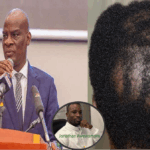
In Ghana, our secondary schools have long been celebrated as spaces for learning, discipline, and the molding of character.
A recent statement by Education Minister Haruna Iddrisu, boldly declaring that long hair would not be tolerated in senior high schools because “school isn’t a beauty contest”, rekindled an old and uncomfortable national debate. He may not have anticipated the emotional firestorm that would follow. The Minister’s remarks made in defense of a rule that requires students to keep low haircuts have triggered widespread public reaction, with many asking a fundamental question: What Ghanaian character has this decades-old rule actually molded?
Across social media and talk shows, the nation has been divided. Some defend the rule as part of Ghana’s tradition of discipline; others view it as a relic of colonial-era control, a regulation that no longer serves the aspirations of a modern democracy. Indeed, this debate is not about hairstyles alone. It is about what kind of citizens we want to shape, and whether the symbols of discipline we cling to have any measurable moral or developmental outcome.A Tradition That Cuts Too Deep
As we stand in 2025, when the world’s most advanced societies are rethinking what discipline truly means, we must ask: Is this tradition still relevant?
For many defenders of the policy, the reasoning is simple: discipline begins with appearance. To them, a neat haircut reflects respect, humility, and readiness to learn. But to a growing number of Ghanaians, especially the youth, this argument feels worn out and seen as a hangover from the colonial classroom. Principals and teachers have proudly linked this to moral formation, arguing that neatness and conformity reflect obedience and respect. But after all these years of cutting, one cannot help but ask, what has the hair we cut achieved?
If short hair truly molds character, Ghana should by now be overflowing with leaders of integrity. Yet, the very society that enforces this rule has produced public officials who loot state coffers, contractors who inflate projects, and citizens who look the other way when corruption thrives. Did they also not cut their hair? Did the uniform haircuts of the past translate into uniform honesty, accountability, and patriotism? This is not to mock, but to provoke reflection. There is, of course, value in discipline and order. But True character is shaped not by the length of hair, but by the length of one’s conviction: by honesty, empathy, and responsibility, values that no barber’s clipper can trim or polish.
A Colonial Legacy We Forgot to Question
The practice of enforced haircutting has roots in colonial education systems. European missionaries viewed African hair as “unruly” and sought to standardize appearance to promote “civilization.” The goal was control, not morality. Ironically, we inherited their classrooms, their curricula, and their scissors and we still call it discipline. Today’s Ghanaian student is growing up in a digital and globalized world where several strict colonial era controls need to be revised.
Hair, Symbolism, and Identity
Sociologists and psychologists agree that hair carries profound symbolic meaning. In many cultures, cutting or growing hair represents transformation, mourning, or freedom. In Ghana, colonial administrators enforced haircuts in schools partly to impose “uniform civilization” on African subjects a way of shaving away “native identity” and asserting control.
Yet, personal grooming has evolved globally as an expression of identity. A student’s hairstyle does not necessarily signal rebellion; it can reflect personality, culture, or faith. Forcing uniformity, in a world that celebrates freedom and creativity, risks teaching our youth that obedience matters more than originality. And that lesson, more than long hair, may be what truly holds back progress.
What Do Global Examples Tell Us?
Let’s take a sober look beyond our borders. In China, students in top technology and science schools from Tsinghua to Peking University are not restricted by hairstyle. The Chinese government focuses on academic rigor, innovation, and discipline in thought, not hair length. The result? A nation that has turned human capital into high-tech powerhouses.
In the United States, schools generally allow moderate self-expression as long as hygiene and safety are maintained. American students can code, debate, or invent with afros, dreadlocks, or curls no correlation exists between short hair and moral fiber.
In Finland, a global model for education, students are not policed for appearance; they are nurtured for curiosity. Teachers focus on empathy, collaboration, and real-world problem-solving.
And in Japan, where social discipline is legendary, hairstyle regulations have been relaxed in recent years following public backlash over outdated rules that had no measurable link to academic excellence or social conduct.
So why do we, in Ghana, cling to a colonial grooming policy that neither improves moral outcomes nor educational standards?
The Myth of Character by Haircut
Character is not molded by haircuts; it is molded by values, accountability, and environment. A student with long hair who learns integrity, compassion, and discipline will serve the nation far better than a clean-shaven student who cheats on exams or accepts corruption as normal.
If we are honest, Ghana’s moral crises from exam malpractice to political corruption did not sprout from hairstyles but from a bad system. Education should not suppress individuality under the pretext of uniformity. It should build confident and responsible thinking citizens capable of questioning and improving society.
Rethinking “Character Formation”
School authorities are right to want to shape character that is non-negotiable. But character formation in the 21st century demands more than colonial codes of neatness. It requires emotional intelligence programs, civic education, mentorship, and ethical leadership by example.
When teachers take bribes, when officials mismanage funds, when honesty is punished and mediocrity rewarded, students learn a dangerous lesson: that the rules apply only to the powerless. So, before we shave their heads, perhaps we should first shave our hypocrisy.
Learning from the Best: What Works Elsewhere
In Singapore, discipline is paired with purpose. Students follow clear codes of conduct, but the focus is on values, education, teaching punctuality, teamwork, respect, and service. In Norway, respect for student rights coexists with high academic standards; appearance policies are minimal, but ethical training is central. Their systems produce citizens who follow rules because they understand their purpose, not because they fear punishment.
Ghana need not copy blindly, but it must adapt intelligently. Our cultural identity can coexist with modern human rights principles. We can preserve respect for authority while allowing harmless personal expression. In short, a neat haircut cannot substitute for a neat conscience.
The Beauty of Our Democracy
The uproar following the Minister’s remarks is, in itself, proof of democratic health. Citizens feel free to question authority, to ask “why” and that is progress. Democracies grow stronger when citizens debate ideas, not when they accept them without thought.
Still, this debate should not end in noise. It should end in policy introspection. Let us review which of our educational traditions truly build disciplined, confident, globally competitive youth and which simply perpetuate outdated control.
Beyond the Barber’s Chair
Perhaps it is time we asked: How long will we keep cutting the hair of our future while ignoring the mindset of our present? If the rule has not demonstrably molded honesty, compassion, or responsibility after decades of enforcement, then it deserves review. As Ghana strives toward a future of innovation and dignity, we must learn that the measure of education lies not in the uniformity of our students’ hair, but in the strength of their minds and the purity of their hearts.
*****
The writer (Jonathan Awewomom) is a Research Scientist based in Miami, FLorida-USA and a Contributor to National Discourse.
- President Commissions 36.5 Million Dollars Hospital In The Tain District
- You Will Not Go Free For Killing An Hard Working MP – Akufo-Addo To MP’s Killer
- I Will Lead You To Victory – Ato Forson Assures NDC Supporters
Visit Our Social Media for More




